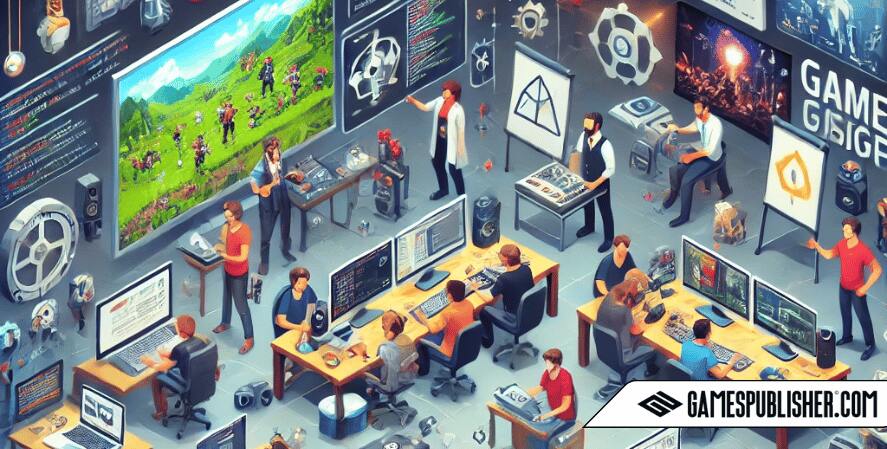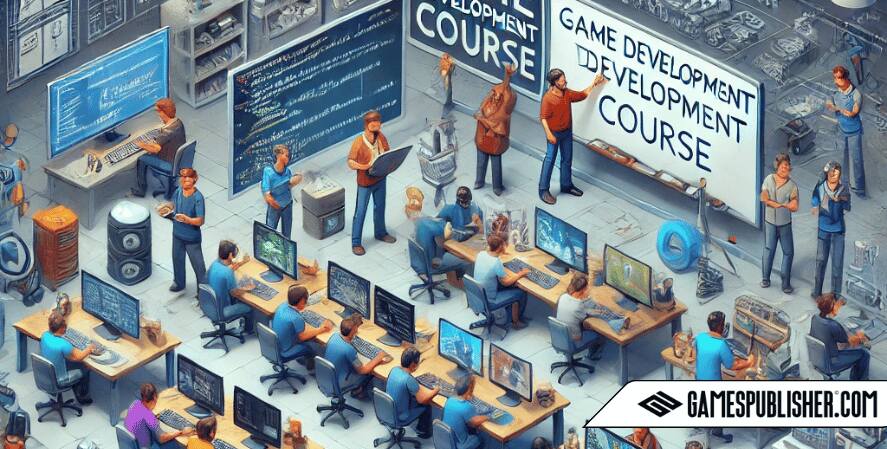The gaming industry is dynamic. It’s a world of innovation and creativity. Game programmers and developers have a pivotal role. Are you an aspiring game developer or someone looking to dive into this lively field? You must understand how to choose the right game programming course.
The proper education can lay the groundwork for a successful career. It provides the skills and knowledge needed to excel in game development and publishing.
Game programming and development courses are not just about learning to code. They cover a broad set of skills. These include design, art, and sound. The gaming industry needs skilled professionals. These courses offer a path to well-paying and fulfilling careers.
Table of contents
- Overview of Game Programming and Development
- Types of Game Development Courses
- Key Elements of a Good Game Development Course
- Top Institutes and Platforms Offering Game Development Courses
- Free and Paid Course Options
- Career Opportunities and Industry Outlook
- Tips for Choosing the Right Course
- Conclusion
Overview of Game Programming and Development

Definition and Scope
Game programming and development involve creating interactive entertainment software for various platforms, including PCs, consoles, and mobile devices.
This field requires creativity. It needs technical skill and a deep grasp of software development. Game developers work on coding. They design game mechanics and create assets. They ensure the final product engages users.
Game development has a vast scope. It offers many career paths. These include game designers, programmers, artists, and sound engineers. The industry is always changing. You can find opportunities in indie game development. You can also find them at major game studios and publishers.
Importance of Formal Education
Self-learning and projects can build basic skills. But, formal education and training are vital for full understanding and professional growth. Formal courses provide structured learning. They also give access to experienced mentors and exposure to industry tools and practices.
These courses also make networking easier. They often include practical projects that copy real-world scenarios. This is key for building a strong portfolio.
Types of Game Development Courses
Online vs. Offline Courses
Online Courses:
- Pros: Flexibility, accessibility, often more affordable.
- Cons: Requires self-discipline, less direct interaction with instructors.
Offline Courses:
- Pros: Structured learning environment, face-to-face mentorship, hands-on experience.
- Cons: Typically more expensive, less flexible with time.
Short-term vs. Long-term Programs
Short-term Certification Courses:
- Pros: Quick skill acquisition, focused content, lower cost.
- Cons: Limited depth, may lack comprehensive coverage of topics.
Long-term Degree Programs:
- Pros: In-depth knowledge, broader curriculum, often includes internships and networking opportunities.
- Cons: Time-consuming, higher cost.
Key Elements of a Good Game Development Course

Curriculum and Specializations
A robust game development course should cover essential subjects and offer specializations such as:
- Game Design: Principles of designing engaging and balanced games.
- Programming: Languages such as C++, C#, and Python, along with game engines like Unity and Unreal Engine.
- Art and Animation: Creating visual assets, character design, environment modeling.
- Sound Design: Integrating audio elements to enhance the gaming experience.
Hands-on Projects and Practical Experience
Practical experience is crucial in game development. Such courses include hands-on projects, game jams, and internships. They help students apply theory in the real world, making them ready for industry.
Access to Industry Tools and Software
Access to industry-standard tools and software is essential. These include Unity, Unreal Engine, Maya, and Photoshop. Familiarity with these tools during coursework ensures that students are well-prepared for professional environments.
Top Institutes and Platforms Offering Game Development Courses
Universities and Colleges
Several renowned universities and colleges offer degree programs in game development, including:
- DigiPen Institute of Technology: Known for its comprehensive game development programs.
- University of Southern California (USC): Offers a renowned Interactive Media & Games Division.
- Savannah College of Art and Design (SCAD): Provides specialized programs in game design and development.
Online Learning Platforms
Popular online platforms offering game development courses include:
- Coursera: Partners with top universities to offer courses in game programming and design.
- Udacity: Offers a Nanodegree program in VR development and other gaming courses.
- edX: Offers courses from prestigious institutions such as MIT and Harvard.
Free and Paid Course Options
Free Resources and MOOCs
For those on a budget, several free resources and MOOCs (Massive Open Online Courses) are available:
- Coursera and edX: Offer free audit options for many game development courses.
- Khan Academy: Provides foundational programming courses.
- MIT OpenCourseWare: Features free course materials from actual MIT classes.
Paid Courses and Bootcamps
Investing in paid courses and bootcamps can offer intensive, fast-tracked learning with greater support:
- Udacity Nanodegree Programs: Focused, mentor-supported, with career services.
- Full Sail University Online: Offers specialized degrees in game development.
- Game Development Bootcamps: Intensive, short-term programs focusing on practical skills.
Career Opportunities and Industry Outlook

Job Roles and Responsibilities
The gaming industry offers diverse job roles, each with specific responsibilities:
- Game Programmer: Writing and testing code, developing game mechanics.
- Game Designer: Creating game concepts, storylines, and levels.
- Game Artist: Designing characters, environments, and visual effects.
- Sound Designer: Producing audio assets and integrating them into the game.
Industry Trends and Future Prospects
The gaming industry is rapidly evolving, with trends such as:
- Virtual Reality (VR) and Augmented Reality (AR): Growing demand for immersive gaming experiences.
- Mobile Gaming: Expanding market with a significant revenue share.
- Esports: Professional gaming as a spectator sport, creating new opportunities for game developers.
Tips for Choosing the Right Course
Assessing Personal Goals and Interests
To choose the right course, assess your personal goals and interests. Consider whether you want to focus on programming, design, art, or another aspect of game development.
Evaluating Course Content and Reviews
Evaluate course content and read reviews before enrolling. Look for courses that offer comprehensive curricula and practical projects.
Importance of Networking and Mentorship
Networking opportunities and mentorship are crucial. Choose courses that let you interact with industry pros. Also, look for access to a supportive community.
Conclusion
Picking the right game programming course is a big step. It’s key to a successful gaming career. You can find a course that fits your goals by exploring options.
You should evaluate the content. Think about your goals. Invest in your education to gain the skills and knowledge needed to thrive in this field. For more help, visit [Gamespublisher.com]It’s your go-to source for aspiring game developers.
Loading survey...

